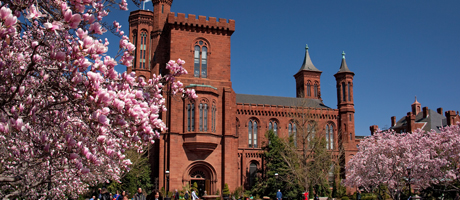Recognizing leadership skills as fundamental to professional development, Columbian College’s Museum Studies Program and the Smithsonian Affiliations have signed an agreement to offer leadership training for museum professionals. The new leadership seminar marks the latest in a long-standing collaborative relationship between the Smithsonian and GW that encompasses internships, fellowships, and joint research initiatives.
The two-day seminar, to be held at GW on June 26-27, will bring together as many as 30 curators, directors, collections managers, marketing specialists, and development staffers for intensive and interactive forums. Discussions will examine current museum trends and challenges, from strategic thinking and leadership philosophy to fundraising and advocacy. Future leadership training programs will be developed to serve museums here and abroad based on the success of this pilot program.
“The goal of this collaboration is to help staff at all levels position themselves and their organization for success,” said Martha Morris, associate professor and assistant director of the Museum Studies Program, a nationally-recognized graduate training program with core curriculum in collections, exhibition development and design, new media, and museum management and leadership. “We want to help museum staff build their skills. And we want to provide them access to people at the Smithsonian and GW who have years of experience and expertise.”
Smithsonian Affiliations is a national outreach program that develops long-term, collaborative partnerships with museums, educational institutions, and cultural organizations. There are nearly 200 Smithsonian Affiliates in more than 40 states, Puerto Rico, and Panama. The affiliates are museums of different sizes and scopes, from large history and art venues to children’s centers and small community museums.
“Each year, millions of Americans walk through the doors of Smithsonian affiliate museums to experience countless artistic, scientific, historic, and cultural treasures,” said Harold Closter, Smithsonian Affiliations director. “Our affiliates recognize the need to hone their skills and continue their professional growth in order to enrich museum-going for generations to come. We are honored to join forces with the Museum Studies Program at George Washington University to offer this unique opportunity.”
Museums have seen a shift in their business and cultural landscape over the last few decades. Globalization, new technologies, competition, collections preservation, financial turmoil, and staffing turnover have all changed the ways museums operate. As professional standards continue to evolve, museum executives say they need highly-trained staff, committed governance, and innovative leaders to assure their long-term sustainability.
Morris and Closter worked together to design the seminar after surveying the professional development needs of Smithsonian affiliates, which range in staff size from three or four to several hundred. The common concern among the museums surveyed was the need for better communications, team-building, and a clearer understanding of finance and fundraising. “We put all of that into the program,” said Morris.
Facilitating the Leadership Seminar will be Smithsonian professionals, museum CEOs, and GW faculty. Agenda highlights include sessions on:
- Strategic Thinking: Designed to give museum staffers a clearer view of the “big picture” landscape, the emphasis of this discussion will be on creating a collaborative environment, the application of ideas, and the need to take risks to adapt to changing needs.
- Finance: While many museum professionals have backgrounds in so-called creative fields—historians, artists, anthropologists, scientists—they often lack a basic foundation of financial knowledge. This session focuses on business-skill building and strategies for presenting compelling content to potential donors.
- Communications, Advocacy, Collaboration: Museums and the presentation of exhibits are an ever-evolving dynamic. This hands-on workshop will help participants implement new blueprints—and build coalitions to support their ideas.


